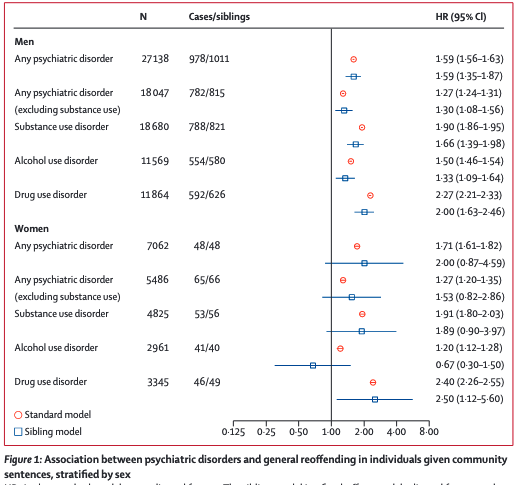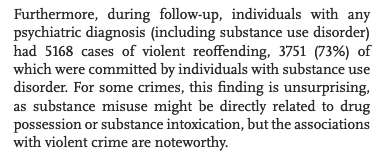
New paper!! Examines a neglected population in the area of health and justice - people given community snetneces. What is contribution of psychiatric disorders to any and violent reoffending? Large population study (n=82k), sibling controls. Short 🧵👇thelancet.com/journals/lanpu… 

Despite community *sentences* being widely used, reoffending rates are not low. Recidivism rates in UK >25% over 1 yr. In many countries, >20% over 1-2 yrs. Figure 👇from 2019 review (and note higher rates in Norway than Ireland/Holland): journals.plos.org/plosone/articl… 2/ 

Little known about modifiable risk factors for reoffending, esp. psychiatric disorder and substance misuse. Previous work not used diagnostic categories or considered familial confounding. These disorders common in this population, who rarely seek help from community services. 3/ 

So we identified all those given community sentences over 14 yrs in Sweden (n=82k), examined healthcare records for ICD-10 psychiatric diagnoses and comorbidities, and followed them up for any reoffending and violent reoffending. 4/ 

Compared those with and without psychiatric disorders for reoffending risk. Examined sibling pairs given community sentences (discordant for psych diagnosis). In cohort, 41% women (3rd column) had substance use disorders. Overall (4th column), 3% scz, 9% depression, 5% ADHD. 5/ 

Finding 1 - reoffending rates. Over median of 3.5 yrs, in men 48% committed new offences, and 15% violently. Women 38% reoffended, 7% new violent offences. Underscores importance of addressing recidivism risk. 6/ 

Finding 2 - psychiatric disorders were associated with increased risk. Little attenuation in sibling models - suggesting the association independent of many confounders (incl. childhood environment). Similar pattern for general and violent reoffending. 7/ 

Finding 3 - important links with individual psychiatric disorders and comorbid substance misuse. In general reoffending, increased risk explained by comorbid substance misuse. In violent reoffending, not entirely explained. Some residual risk remains in schizophrenia, bipolar. 8/ 



Conclusions 1 - large burden of psychiatric morbidity + substance misuse in community sentenced. >1 in 4 women had alcohol misuse; 40% with substance misuse, 17% depression, 5% scz. In men, >1 in 4 substance misuse. Opportunity to treat many young people (mean age=29) 9/
Substance misuse was associated with highest absolute and relative risks of general and violent reoffending. In mental illness, comorbid substance misuse substantially increased risk, esp. in schizophrenia, women. 10/ 

For violent reoffending, comorbidity wasn't the whole story. Other illness-specific factors will be relevant, and non-specific ones (e.g. reduced work and social support). 11/ 

Main implication - to improve reoffending outcomes, public health and safety, there needs to be improved detection of psychiatric and substance use disorders at early stages of the criminal justice system, and implement/divert people to accessible and scalable treatments. 12/ 

But easier said than done. Previously shown poor evidence base for psychological treatments in criminal justice. thelancet.com/journals/lanps…. This extends to most effective services - MH courts, liaison and diversion teams, police-led ones. We don't know. A priority for research 13/ 

Cost savings potentially large if more resources moved to services focused on prevention of violence perpetration in people with mental illness. In Eng/Wales, estimated to be up to £2.5B/yr: thelancet.com/action/showPdf… Part of solution will include community MH + drug services. 14/ 

Excellent collab w/@forensicrg, Paul Lichtenstein at @karolinskainst. Funded by @wellcometrust. Paper #OA @TheLancetPH.
p.s trying to figure out my spelling (snetneces) in 1st tweet. Is it some subliminal association with covfefe? Or coffee-withdrawal neologism? Or some link with 'snet' - old English word for blowing one's nose. Answers on a postcard.
• • •
Missing some Tweet in this thread? You can try to
force a refresh










